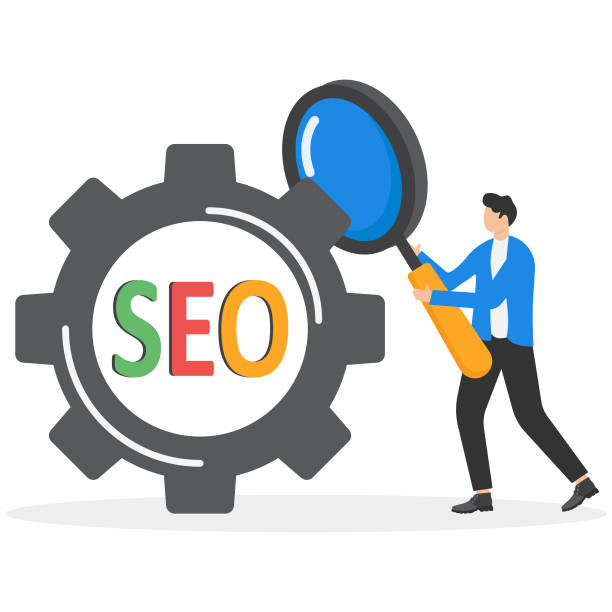Introduction to SEO and Why It Matters
In today’s competitive world, an online presence is vital for any business, and achieving this presence without a deep understanding of SEO (Search Engine Optimization) seems almost impossible.
SEO is a set of techniques and strategies aimed at improving a website’s ranking in the organic search results of engines like Google, Bing, and Yahoo.
When a user searches for a phrase on Google, complex search engine algorithms scan thousands or millions of pages to provide the most relevant and high-quality results.
Digital marketing today is practically incomplete without considering this optimization process (SEO).
The ultimate goal of SEO is to increase website visibility, attract more traffic, and ultimately, boost conversion rates.
In fact, SEO helps businesses stand out among a wealth of information and reach their target audience.
It is an ongoing and dynamic process that requires continuous updates and adaptation to changes in search engine algorithms.
Understanding the basics of SEO, how it works, and its proper implementation can make a huge difference in a business’s online success.
Without SEO, even the best content and products may get lost in the vast ocean of the internet.
#SEO #Optimization #SearchEngine #WebTraffic #SiteRanking
Do you know that a weak corporate website takes many opportunities from you daily? Solve this problem forever with professional corporate website design by Rasavab!
✅ Create a powerful and reliable image for your brand
✅ Attract new customers purposefully and increase sales
⚡ [Receive free website design consultation]
Types of SEO and Key Optimization Approaches
To achieve a comprehensive strategy, understanding the main types of SEO is essential.
Generally, SEO is divided into three main categories: On-Page SEO, Off-Page SEO, and Technical SEO.
Each of these sections focuses on different aspects of the website and its environment and mutually influences each other.
On-Page SEO refers to all actions performed directly on your website pages, such as optimizing keywords, titles, meta descriptions, URL structure, and web content.
The goal of On-Page SEO is to send clear and useful signals to search engines about the topic and quality of your content.
In contrast, Off-Page SEO includes activities performed outside your website, aiming to increase your website’s authority and credibility.
The main component of Off-Page SEO is Link Building, which involves obtaining links from other reputable websites.
These links show search engines that your content is valuable and trustworthy.
Finally, Technical SEO deals with optimizing the technical infrastructure of the website to facilitate its crawling and indexing by search engines.
Factors such as site loading speed, mobile compatibility, site structure, and the use of XML sitemaps and robots.txt files fall into this category.
All three aspects are vital for an effective SEO strategy and should be considered simultaneously to optimize the website as best as possible for search engines.
Keyword Research and Rich Content for SEO
The foundation of any successful SEO strategy is comprehensive keyword research.
Keywords are the phrases users enter into search engines, and you want your website to rank high for those phrases.
This process is not just about finding high-volume keywords, but understanding the user’s intent behind those searches.
Keywords should align with your audience’s needs and have the ability to attract targeted traffic.
Various tools like Google Keyword Planner, Ahrefs, and Semrush can help you in this journey.
After identifying suitable keywords, the next step is to produce rich and valuable content built around these keywords.
Content can be in various formats: educational articles, news posts, explanatory guides, thought-provoking content, analytical reports, and even entertaining material.
The important point is that the content should be both engaging for users and understandable for search engines.
Proper and natural use of keywords in the text, titles, meta descriptions, and image alt tags are important principles for producing SEO-optimized content.
Specialized and unique content that answers users’ questions and adds value has a high chance of achieving a better ranking.
Precise implementation of these principles is very important for improving SEO ranking.
| Content Type | Main Goal | SEO Impact | Example |
|---|---|---|---|
| Educational Content | Education and Awareness | Increase organic traffic, site authority | “How-to” articles, guides |
| Explanatory Content | Answering Specific Questions | Attract users with purchase intent, reduce bounce rate | FAQ pages, glossary definitions |
| Analytical Content | In-depth Analysis and Insight | Attract expert audience, increase dwell time | Industry reports, product reviews |
| News Content | Informing about Current Events | Attract high short-term traffic, generate natural backlinks | Industry news, press releases |
| Thought-Provoking Content | Stimulating Discussion and Interaction | Increase user engagement, social signals | Surveys, controversial articles |
Click here to preview your posts with PRO themes ››
Technical Website Optimization for Enhanced SEO Performance
Technical SEO is the backbone of any successful SEO strategy.
This part of SEO ensures that your website is technically in the best possible condition for crawling, indexing, and ranking by search engines.
One of the most important aspects of technical SEO is website loading speed.
Slow websites provide a poor user experience and can harm your rankings.
Tools like Google PageSpeed Insights can help you identify and fix speed issues.
Another crucial aspect is mobile compatibility.
With the increasing use of mobile devices for searching, Google has adopted a “Mobile-First Indexing” approach, meaning that the mobile version of your website is the primary criterion for indexing and ranking.
Ensuring website responsiveness and providing a suitable user experience across all devices is essential.
URL structure, the use of SSL certificates (HTTPS), robots.txt file for controlling crawler access, and XML sitemaps to help search engines discover your pages are also important factors in technical SEO.
Fixing technical errors and maintaining the overall technical health of the site provides a solid foundation for future successes in SEO optimization.
This section is specialized and requires considerable technical knowledge.
Does your current corporate website present a worthy image of your brand and attract new customers?
If not, turn this challenge into an opportunity with Rasavab’s professional corporate website design services.
✅ Significantly improves your brand’s credibility and image.
✅ Paves the way for attracting new leads and customers for you.
⚡ For free and specialized consultation, contact Rasavab now!
On-Page SEO and Key Tips for Ranking Improvement
On-Page SEO refers to all actions performed directly on your website pages to improve their ranking in search engine results.
These actions help search engines understand the topic of your content and link it to relevant user searches.
The first and perhaps most important element is the Title Tag.
The title should include the main keyword of the page and be attractive and persuasive to encourage users to click.
Meta Description, although not directly affecting ranking, can increase the click-through rate (CTR).
Using heading tags (H1, H2, H3…) for structuring content and highlighting keywords is also very important.
H1 should be the main title of the page and used only once, while H2 and H3 are used for subheadings.
Optimizing images with descriptive alt tags that include relevant keywords is not only beneficial for image SEO but also helps improve accessibility.
High-quality and comprehensive content, which answers users’ questions and delves deeply into the topic, is the foundation of successful On-Page SEO.
On-Page SEO optimization requires precise analysis and continuous updates to keep your site always at its highest performance level.
A specialized guide can be very helpful in this regard.
Off-Page SEO and Effective Link Building for Authority
Alongside On-Page and Technical SEO, Off-Page SEO plays a vital role in a website’s credibility and domain authority.
Off-Page SEO refers to all activities performed outside your website that affect its ranking in search results.
The most important and influential aspect of Off-Page SEO is Link Building.
Links from other websites to yours (backlinks) act like votes of confidence and show search engines that your content is valuable and authoritative.
The quality of backlinks is more important than their quantity; one link from a reputable and relevant website is worth far more than dozens of links from low-quality websites.
Link-building strategies include creating shareable content that naturally attracts backlinks, publishing guest posts on other websites, participating in relevant online forums, and using social media to increase content visibility.
Activity on social networks, although not directly affecting SEO, can help increase brand awareness, attract traffic, and ultimately create link-building opportunities.
Local SEO is also an important aspect of Off-Page SEO, especially for physical businesses.
Registering in local directories like Google My Business and receiving positive customer reviews can help your business stand out in local search results.
This part of SEO requires extensive effort and networking.
SEO Success Metrics and Analytical Reporting
To ensure the effectiveness of your SEO strategy and its continuous improvement, performance measurement and monitoring are essential.
Without accurate data, you cannot understand which of your SEO tactics have been effective and which need optimization.
Tools like Google Analytics and Google Search Console are among the most important free tools for SEO data analysis.
Organic Traffic is one of the main metrics that shows how many visitors have come to your website through search engines.
Click here to preview your posts with PRO themes ››
Other key metrics include Click-Through Rate (CTR), which indicates the percentage of users who clicked on your website after seeing it in search results, and Bounce Rate, which shows the percentage of users who viewed only one page and then left the website.
Keyword rankings, average time on site, and exit pages are also important data points that provide valuable insights.
Generating regular and analytical reports from these metrics helps you identify the strengths and weaknesses of your SEO strategy and make data-driven decisions for future improvements.
This is a specialized and time-consuming process, but its results will be very valuable.
| Metric | Description | Monitoring Tools | SEO Importance |
|---|---|---|---|
| Organic Traffic | Number of visitors from search results | Google Analytics | Primary indicator of SEO success |
| Click-Through Rate (CTR) | Percentage of clicks based on impressions | Google Search Console | Indicates attractiveness of title and meta description |
| Bounce Rate | Percentage of users leaving after one page | Google Analytics | Indicates quality and relevance of content |
| Keyword Position | Page ranking for specific keywords | Google Search Console, Semrush, Ahrefs | Indicates ranking in search results |
| Time on Page | Average time users spend on a page | Google Analytics | Indicates attractiveness and usefulness of content |
SEO for E-commerce and Local Businesses
SEO has its own specific considerations and strategies for both e-commerce businesses and local businesses.
In the e-commerce sector, the main challenge is optimizing a large number of product and category pages.
Keywords in these types of websites often include long-tail keywords that clearly indicate the user’s purchase intent.
Optimizing product descriptions, using high-quality and optimized images, and providing a smooth user experience for purchasing are of particular importance.
Additionally, using structured data (Schema Markup) to display product information such as price, availability, and customer reviews in search results can significantly increase click-through rates and improve SEO rankings.
For local businesses, the main goal is to attract customers near the business’s physical location.
Local SEO includes actions such as registering and optimizing Google My Business profiles with accurate and up-to-date information (Name, Address, Phone), obtaining and responding to positive customer reviews, and ensuring NAP (Name, Address, Phone) information consistency across all online directories.
These strategies help local businesses appear in “Google Maps” results and “Near Me” searches, attracting more physical and online traffic.
In both cases, competitor analysis and understanding the specific needs of the audience are key to success in SEO.
These points constitute a comprehensive guide for online and local businesses.
Is your online sales not as expected? With Rasavab, solve the problem of low sales and poor user experience forever!
✅ Increase visitor to customer conversion rate
✅ Create an enjoyable user experience and increase customer trust
⚡ Act now for a free consultation!
The Future of SEO and Upcoming Developments in Optimization
The world of SEO is constantly evolving, and what is effective today may become obsolete tomorrow.
With advancements in technology and changes in user behavior, SEO specialists must constantly keep themselves updated with the latest trends and search engine algorithms.
One of the most important future trends is an increased focus on User Experience (UX).
Google increasingly cares about the experience users have after entering a website.
Factors like Core Web Vitals (loading speed, interactivity, visual stability) directly impact rankings.
Voice Search is also a growing trend that changes the way users search.
Optimizing for voice search requires understanding natural language and conversational keywords.
Furthermore, Artificial Intelligence (AI) and machine learning will play a more prominent role in search engine algorithms.
Google’s algorithms like RankBrain and BERT indicate this trend, showing that search engines understand user intent better than ever.
Producing specialized and in-depth content that answers complex questions will become increasingly important.
Embracing these changes and preparing for them is key to maintaining and improving SEO ranking in the coming years.
A deep analysis of these trends can illuminate the future path of SEO.
Common SEO Mistakes and Smart Solutions
On the path to SEO optimization, mistakes can occur that can severely damage your website’s ranking.
One of the most common mistakes is Keyword Stuffing.
Overstuffing text with keywords is not only unpleasant for users but is also recognized as a spam tactic by search engines and leads to website penalties.
Instead, keywords should be integrated naturally and intelligently into the content.
Another mistake is producing low-quality or duplicate content.
Search engines prefer original, comprehensive, and valuable content; duplicate or low-value content not only fails to rank but can also harm the site’s credibility.
Click here to preview your posts with PRO themes ››
Ignoring technical SEO is also a major error.
Technical issues like slow site speed, lack of mobile compatibility, and crawling errors can render even the best content ineffective.
Poor link building or using spammy links are also common mistakes in Off-Page SEO that can lead to Google penalties.
Instead of buying low-quality links, focus on acquiring natural and valuable links from reputable websites.
Finally, lack of data tracking and analysis is also a strategic error.
SEO is an ongoing process, and without performance monitoring and strategy updates, you cannot achieve sustainable results.
By avoiding these mistakes and following SEO guidelines, you can achieve lasting success in improving your ranking and strengthen SEO results.
Frequently Asked Questions
| Question | Answer |
|---|---|
| What is SEO? | SEO, or Search Engine Optimization, is a process of increasing the quality and quantity of website traffic by improving the site’s ranking in natural (organic) search engine results like Google. |
| What are the main types of SEO? | SEO is divided into three main categories: On-Page SEO, Off-Page SEO, and Technical SEO. |
| What does On-Page SEO include? | On-Page SEO includes optimizing elements within the website, such as keywords, Title Tag, Meta Description, content, URL structure, images, and internal links. |
| What is Off-Page SEO? | Off-Page SEO refers to activities outside the website that help improve its ranking, such as Backlink Building, social media marketing, and Brand Mentions. |
| What is Technical SEO? | Technical SEO focuses on optimizing the technical aspects of a website to help it be better crawled and indexed by search engines. This includes site speed, mobile-friendliness, site structure, Sitemaps, and Robots.txt files. |
| What role do Keywords play in SEO? | Keywords are phrases that users enter into search engines. Correct and targeted use of relevant keywords in content and site elements helps search engines understand your page’s topic and display it for relevant searches. |
| What is a Backlink and why is it important? | A backlink, or inbound link, is a link from one website to another. Backlinks act as a “vote of confidence” from other sites for search engines and play an important role in the credibility and ranking increase of a site, especially if they are from reputable sites. |
| What impact does quality content have on SEO? | Quality, relevant, comprehensive, and unique content not only attracts and retains users but also shows search engines that your page is valuable. This helps improve rankings, reduce Bounce Rate, and increase user time on site. |
| Why is website loading speed important for SEO? | Website loading speed is an important ranking factor for Google. Faster sites provide a better user experience, have lower bounce rates, and are preferred by search engines. |
| Is SEO a one-time process? | No, SEO is an ongoing and long-term process. Search engine algorithms are constantly changing, competition is increasing, and website content also needs updating. Therefore, SEO requires continuous monitoring, analysis, and optimization. |
And other services of Rasa Web Advertising Agency in the field of advertising
Smart Content Strategy: A new service for increasing online growth through precise audience targeting.
Smart Marketplace: A dedicated service for online growth based on SEO-driven content strategy.
Smart Advertising Campaign: A fast and efficient solution for online growth focusing on intelligent data analysis.
Smart Advertorial: A creative platform for improving customer acquisition with Google Ads management.
Smart Social Media: A new service for increasing digital branding through the use of real data.
And over hundreds of other services in the field of internet advertising, advertising consultation, and organizational solutions
Internet Advertising | Advertising Strategy | Advertorial
Resources
Strategic Importance of SEO in Business Growth
The Role of SEO in Digital Development
SEO and Expanding Online Presence
SEO Strategies for Digital Success
? To elevate your business’s position in the digital world and achieve peak success, Rasavab Afarin Digital Marketing Agency offers comprehensive and effective solutions. From responsive website design to search engine optimization, get professionally noticed with us.
📍 Tehran, Mirdamad Street, next to Central Bank, Southern Kazeroun Alley, Ramin Alley, No. 6












